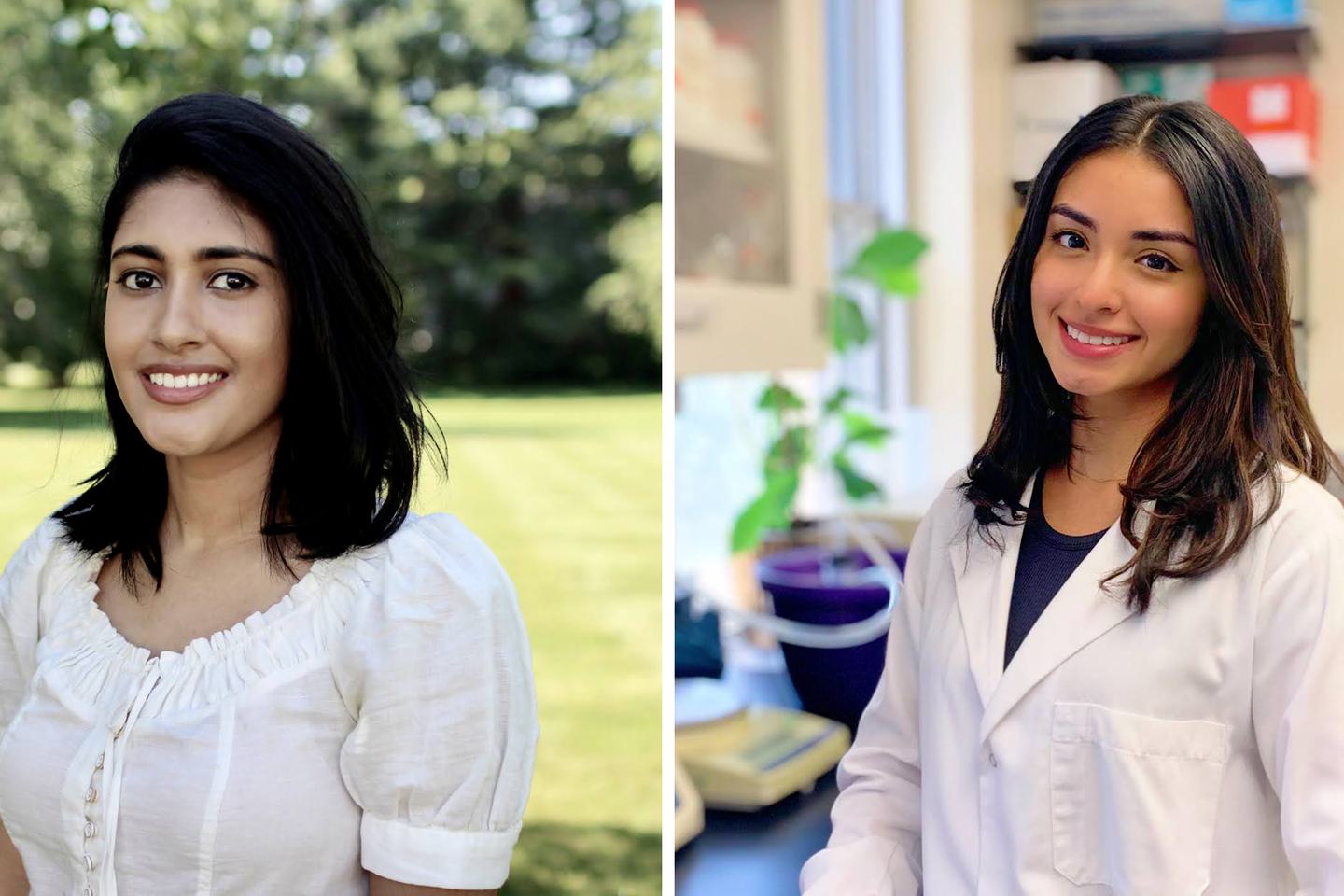Harshini Raman ’22 and Alex Martinez Lopez ’22 were among the 409 college students from all over the United States to receive 2021 Barry Goldwater Scholarships, awarded to young scholars who intend to pursue research careers in the fields of the natural sciences, engineering, and mathematics. Raman and Martinez Lopez, neuroscience majors who have worked in labs at Wellesley and off-campus, are also immigrants who are the first in their families to pursue careers in scientific research, and both said they are grateful for the support of the Wellesley community.
As a prospective student, Raman vividly recalls visiting the class of Marc Tetel, Dorothy and Charles Jenkins, Jr. Distinguished Professor of Neuroscience. Raman said she had always had an “inkling toward the sciences,” but visiting a neuroscience class at Wellesley sealed the deal. She also chatted with Tetel about his research on the gut-brain connection. By the spring of her first year, Raman was working in the Tetel lab, and she contributed to two mouse-model experiments, studying the connection between the gut microbiome and anxiety in female mice. “The Tetel lab provided a really safe environment to make mistakes and grow as a scientist,” Raman said.
“Harshini is not intimidated by challenges, but on the contrary, she seeks them out,” Tetel said. “[Her] sense of intellectual adventure will serve her well in her career.”
Martinez Lopez also had a formative experience in a Wellesley lab, working with Barbara S. Beltz, Allene Lummis Russell Professor of Neuroscience, through the Sophomore Early Research Program. Martinez Lopez has been interested in learning how the central nervous system and immune system interact since high school, when a childhood friend was diagnosed with multiple sclerosis (MS). After her experience in the Beltz lab working with crayfish models, she knew she wanted to learn more about this interaction in disease. Last summer, Martinez Lopez joined the ENDURE program at Washington University in St. Louis, where she virtually worked for the lab of Gregory Wu and studied MS.
Raman and Martinez Lopez said their professors encouraged them to seek additional research experiences off campus. Martinez Lopez is working in person with Wu at Washington University this summer. Through the Tetel lab, Raman did an internship with collaborators at Otsuka Pharmaceuticals during the summer between her first and sophomore years, during which she learned what Tetel called “some very complicated data analysis” and contributed to a publication in which she is now listed as a co-author. Going forward, Martinez Lopez wants to continue bench work in the field of neuroimmunology, while Raman is continuing to use computational methods in her research involving electronic medical records at Children’s Hospital of Philadelphia.
Raman and Martinez Lopez both said they would not be where they are without their support networks at Wellesley. Martinez Lopez is a McNair scholar; the McNair Post-Baccalaureate Achievement Program supports students from low-income, first-generation, and historically underrepresented groups as they prepare for and enter doctoral study.
Martinez Lopez was born in El Salvador, and when she was 7, she left to join her family in North Carolina. No one in her family has a background in research, so she turned to Wellesley faculty and her fellow McNair scholars for advice and support as she applied to programs and figured out her career path. Charlana Simmons, director of the McNair program at Wellesley, described Martinez Lopez as “a bright spot in the program.” “It has been a joy to get to know her,” she said.
Raman spent her early childhood in India and moved to the United States with her family when she was 5 years old. She is the first person in her family to attend college in the U.S. and to pursue a medical career. In high school, she felt she didn’t have anyone to ask for help when it came to her research interests. That all changed at Wellesley when she joined the Tetel lab.
Now, both Raman and Martinez Lopez are committed to helping others the way they were helped along the way. Raman works as a supplemental instruction leader, tutoring fellow Wellesley students who need help with science classes. “I want to continue being involved in teaching and mentorship to give back what I received from my mentors, both at Wellesley and off-campus,” Raman said. Martinez Lopez makes a point to share resources, often telling her peers to look into opportunities she learned about through the McNair program.
To other students hoping to pursue research, Martinez Lopez’s advice is simple: “Don’t be afraid to ask for help!”
